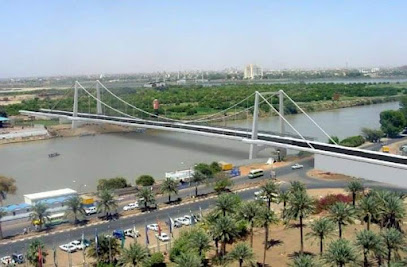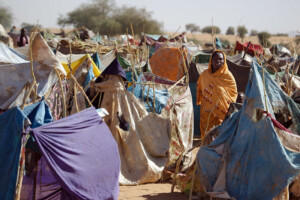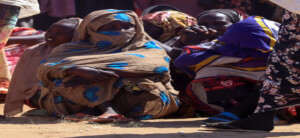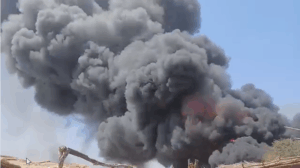Sudan lawyers: ‘starvation sieges’ in Khartoum violate int’l humanitarian law

Tuti Bridge in 2021 (Photo: Abdo Salman / social media)
Fighting between the Sudan Armed Forces (SAF) and the Rapid Support Forces (RSF) persisted across Khartoum state yesterday. Sudan’s Emergency Lawyers strongly condemned the blocking of food transport to the besieged residential areas of Tuti Island, Ombadda in Omdurman, and El Kalaklat in Khartoum. Shells hit the Ethiopian Embassy in El Amarat, Khartoum, prompting the warring parties to swap accusations.
Emergency Lawyers said in a press statement on Monday that it received reports of the death of three people in Tuti, a large island in Khartoum where the Blue Nile and the White Nile meet, as a result of the continued RSF siege. The three victims, among them a child suffering from diabetes, died because of the depletion of medicines.
Six months of fighting in Khartoum state has led to dire humanitarian conditions.
The RSF closed off the Tuti Bridge, the only land road linking the island with the capital, since the early days of the war, the lawyers said. This has led to restrictions on the movement of people, consumer goods, and life-saving medicines, resulting in starvation and several deaths resulting from the lack of medical supplies.
The crisis is compounded by two months of power outages, interrupted water supply, and unsafe drinking water, contributing to the spread of diseases.
Many residents have managed to flee Tuti Island by boat or the bridge, to areas in Omdurman and elsewhere. Radio Dabanga listener Esam told Radio Dabanga he fled Tuti ten days ago for El Sawra in Omdurman. “RSF soldiers closely monitor the bridge linking Tuti Island to Khartoum, allowing crossings only with specific prior permission from their commander”, Esam explained.
The Emergency Lawyers group “holds the RSF fully responsible for the humanitarian situation on Tuti Island and calls on the international community to identify these violations of international humanitarian law and the Statute of the International Criminal Court (ICC)”.
Preventing entry of food
Emergency Lawyers also condemned the army’s blockade of the El Kalaklat neighbourhoods in southwest Khartoum, hindering the entry of consumer goods from the southern direction of Jebel Aulia.
“SAF troops stationed at El Amal Hospital, located at the beginning of the Khartoum-Kosti highway, are confiscating all consumables.”
As a result of the continued intense fighting in the area, a significant number of residents of El Kalaklat have been compelled to abandon their homes.
This week, the army announced that it regained control of El Laffa market in El Kalaklat, previously occupied by the RSF.
Ombadda double blockade
Mohamed, a resident of Ombadda in Omdurman, a locality primarily inhabited by people who fled wars and poverty in Kordofan and Darfur, reported “severe restrictions imposed by SAF members” in the border areas between Karari and Ombadda.
“These restrictions primarily affect the entry of goods into the neighbourhoods, especially vegetables”, Mohamed told Radio Dabanga. Additionally, the RSF demands ’passage fees’ to cross the area.
In a statement last week, Emergency Lawyers reported SAF attempts to besiege the neighbourhoods of Ombadda controlled by the RSF, by “deploying army units in Karari and the seam areas between Karari and Ombadda” – “to limit the flow of goods and foodstuffs from Karari to Ombadda, which is under control of the RSF”.
According to Mohamed, many people in Ombadda fled to El Sawrat in Omdurman due to ongoing shelling.
Residents of Karari reported that the SAF has stationed forces at various locations in the locality, “including Sabreen market, Wad El Bushra, Hemeidan Station, and El Roumi in El Sawrat”.
The army soldiers are confiscating the goods of food traders heading to Ombadda.
Emergency Lawyers reported hearing testimonies from several traders regarding “SAF officers demanding money from merchants in exchange for permitting the passage of goods”.
The lawyers underscored that Rule 53 of International Humanitarian Law explicitly prohibits the use of starvation and deprivation of food as a method of warfare against civilians, considering it an internationally prohibited tactic. The Rome Statute, which is the founding treaty of the ICC, also criminalises the deliberate starvation of civilians.
Continuing violence
Fighting persisted in various parts of Khartoum state yesterday. The army continued its artillery shelling from the Karari military base in north Omdurman, targeting multiple areas, including Khartoum North (Khartoum Bahri).
Activists informed Radio Dabanga that shelling also took place in El Jarafa neighbourhood, far north in Omdurman, on Monday. The Sudanese army yesterday reported that ten people lost their lives due to RSF shelling in El Jarafa.
The El Jereif West Emergency Room in Khartoum reported the death of member Siham Hasan on Monday evening. “She was fatally shot with two bullets to the head and chest inside her home by a member of the RSF.”
According to the statement, the paramilitary member shot Hasan through the window of her house, “after she refused to open the door in an attempt to protect herself and her family”. A state of fear and tension now grips El Jereif West due to reports of several paramilitary members breaking into homes and one reported case of assault.
Hasan was a member of the Women’s Response Room in El Jereif and the El Jereif Block 5 Women’s Association.
The El Abbasiya Resistance Committees in Omdurman reported that a woman and her two sons were killed when a shell struck their house on Sunday. El Jereif East Emergency Room in Khartoum North said that a 13-year-old girl was killed by a shell to the head on Monday.
Swapping accusations
SAF spokesperson Brig Nabil Abdallah accused the RSF of indiscriminate shelling in Khartoum, and condemned reports of RSF paramilitaries wearing uniforms of the army forces.
The RSF accused the army’s warplanes of bombing the Ethiopian embassy buildings in El Amarat, Khartoum, yesterday morning. In a statement posted on X (formerly Twitter), the RSF denounced the incident as “an attack on vital facilities in the country, including diplomatic missions and international organisations”.
Conversely, the SAF denied responsibility and blamed the RSF for the incident. In a statement published yesterday, the army said it “noted the treacherous attack by the dissolved Rapid Support Forces rebel militia on the headquarters of the Ethiopian embassy in Khartoum, followed by a desperate statement in an attempt to pin their crime on the armed forces.”
The Ethiopian ambassador to Sudan, Yibeltal Ayimiro Alemu, confirmed to the BBC that the embassy was partially damaged in Tuesday’s incident, but reported no casualties. Another embassy employee who spoke to the BBC disclosed that another air strike hit the embassy three weeks ago, injuring a security officer and shattering windows.
Brig Abdallah also stated that the SAF repulsed an RSF attack on the 16th Division in Nyala, capital of South Darfur, on Sunday.











 and then
and then